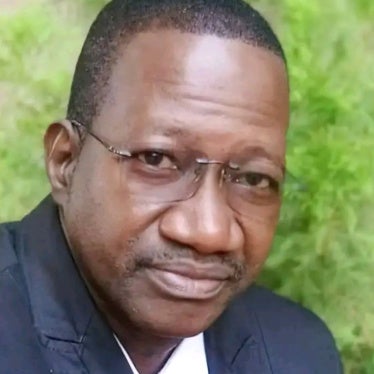(Brussels) - The Senegalese government should promptly investigate the violent assaults on the human rights activists Alioune Tine and Oumar Diallo during a June 23, 2011 demonstration, and prosecute those responsible, Human Rights Watch said today. Human Rights Watch called on the government to allow peaceful demonstrations and to end threats against Tine and other activists.
Tine is the secretary-general of the African Assembly for the Defense of Human Rights (Rencontre africaine pour la défense des droits de l'homme, or RADDHO), a prominent Senegalese human rights organization. During a demonstration before the Senegalese National Assembly against a controversial constitutional amendment regarding presidential elections, youth from President Abdoulaye Wade's Parti Démocratique Sénégalais (PDS) identified Tine and brutally beat him and Diallo, Tine's RADDHO colleague, before other demonstrators pulled them away to safety. Both men were hospitalized.
"It's deeply disturbing that one of Senegal's leading voices on human rights would face this kind of brutality," said Daniel Bekele, Africa director at Human Rights Watch. "Senegalese authorities should not only find the attackers, but also investigate whether state authorities encouraged or ordered the attack."
On June 22, Prime Minister Souleymane Ndéné Ndiaye publicly disparaged Tine in an interview that appeared on Senegalese radio and in print.
Tine described the attack to Human Rights Watch from the hospital, where he is recovering:
Early in the afternoon [of June 23], I was heading back to the National Assembly for the demonstration. I had heard the threats against me yesterday, including from the prime minister himself. As I was passing a side street toward the demonstration, I was targeted. Youth thugs standing in front of the house of their leader Farba Senghor [a high-level member of Wade's PDS] pointed at me and said, "Alioune Tine. It's Alioune Tine." Then they descended on me, hitting me, hitting me everywhere, but especially in the head. There were many of them, it was a crowd of them. Some were throwing rocks, others were kicking me or striking me on the head and neck with their fists or sharp rocks. They were hitting me hard, I was standing and they knocked me down from the beating before continuing to strike me. I tried to protect myself, but they just continued to beat me.
I somewhat lost consciousness, but luckily there were people there who saved me. Youth demonstrators intervened, protected me, and got me away from those who were beating me. Eventually I got to the emergency room.
Tine told Human Rights Watch that he saw blood coming out of the mouth of Diallo, who was beaten severely during the same attack.
Human Rights Watch spoke with several other witnesses who described the event similarly, including a former foreign minister, Cheikh Tidiane Gadio, who escaped the attack mostly unharmed with his bodyguards' assistance. Gadio likewise identified the attackers as youth thugs linked to Senghor. News sources in Senegal have also reported on the targeted assault.
Earlier on the morning of June 23, security forces using teargas, clubs, and water cannons had dispersed demonstrators, including Tine and Gadio. Security forces should not use unnecessary or excessive force against peaceful demonstrators, Human Rights Watch said.
Prime Minister Ndiaye's public remarks about Tine the day before the attack heighten concerns of possible government involvement, Human Rights Watch said. He told the media:
Here is someone who has been in charge of an NGO [nongovernmental organization] for 20 years, yet no one knows how it operates.... He comes and goes depending on the interests he pretends to defend. Right now, he sports the opposition's colors and sometimes even our colors.
Ndiaye also referred to human rights activists more generally as "hypocrites who are afraid to assert themselves." In a June 22 article in Senegal's L'Observateur, the director general of taxes, Amadou Bâ, threatened to withdraw the tax-exempt status of nongovernmental organizations that "failed their mission," and Foreign Affairs Minister Madické Niang was reported to have considered suspending some organizations' registration or host-state agreements.
The June 23 demonstration was against a proposed constitutional amendment by President Wade's party that would include a vice president on the ticket for presidential elections and require a winning candidate to receive only 25 percent of the vote to avoid a second round runoff. The constitution now requires a majority of the vote to avoid a runoff. As demonstrations continued, Wade's Justice Minister Cheikh Tidiane Sy on June 23 announced that the government would drop the amendments.
Many civil society groups, including RADDHO, have called for demonstrations against the proposed amendments, contending that they are designed to improve Wade's re-election bid and allow him to choose his successor. The United States embassy in Dakar released a statement expressing concern "that a constitutional law that would so fundamentally change the system used to elect Senegal's president for the past 50 years has been proposed without the benefit of a thorough, meaningful and open debate among a broad spectrum of groups and concerned citizens." Senegal has been widely regarded as one of the more democratic and human rights-respecting countries in Africa.
"Violent assaults on human rights activists do not reflect well on President Wade's administration," Bekele said. "Attacking the messenger is a worrying sign of increasing repression."







